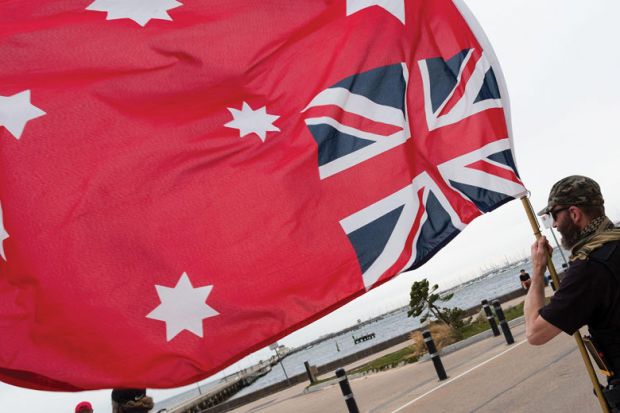Leading legal academics have said they are “not overly concerned” that the Australian government is strong-arming universities to align their policies with its model code on freedom of speech and academic freedom, but described a “bottom-up” code created from within as being vastly preferable.
“A heavily top-down approach is not the best way to protect these values,” said Carolyn Evans, vice-chancellor of Griffith University. “You cannot ignore the regulatory framework or university policies, but work at the ground level is immensely important.
“A good policy is necessary but not sufficient, because any policy is going to have a bit of light and shade. There [will be] some exceptions to the rules. The way those are interpreted and applied, and the extent to which [the policy is] lived across the university community, will be the key.”
English proposals to make protection of free speech a condition of university and college registration – and to fine institutions for breaches – were even less desirable and missed the “fundamental issue”, according to University of Melbourne law professor Adrienne Stone.
“I certainly cannot see anything in Australian universities at the level of seriousness you would need to justify that kind of top-down, punitive approach,” she said. “The most effective way to have vibrant research and teaching communities is to deal with the university as a community and collectively commit to some goals.”
Professor Stone is president of the International Association of Constitutional Law and co-editor of the Oxford Handbook on Freedom of Speech, while Professor Evans is internationally recognised for her expertise in human rights law. Together they have written Open Minds: Academic freedom and freedom of speech in Australia, which has emerged amid regulatory moves to buttress free speech by governments around the world.
However, Professor Evans noted, governments are often anything but the “saviours” of freedom of expression.
“Governments – historically in Australia, contemporarily in many parts of the world – are actually the greatest threats to academic freedom and freedom of speech,” she said. “[They] need to exercise restraint [even if they] have justifiable concern about things going on at universities.”
Too much government interference in universities, she said, undermined the atmosphere of autonomy in which free speech and academic freedom thrive.
The book relates how the Australian government actively undermined academic freedom during the Cold War, when security agency Asio routinely vetted academic appointments to the Australian National University in a McCarthyist hunt for “subversive tendencies”.
Professor Stone cited more recent examples in the vetoing of research grants by education ministers Brendan Nelson and Simon Birmingham. “Control that is too direct enables the government or a minister to target ideas that they happen not to like,” she said.
Australia’s new Foreign Relations Act was another example, Professor Evans said. “The notion that academics need permission from the government to co-author with [someone] from a foreign country; to co-supervise a PhD; to organise a seminar or workshop – that’s a very serious intrusion.”
Poacher-turned-gamekeeper misgivings aside, the two academics argued that any off-the-shelf codification of academic freedom was bound to falter in any case. “Lots of small decisions that academics make every day – about how they conduct their research, or what happens in their classroom – are never the subject of review by anyone else in the university,” Professor Stone said.
“Inevitably there are small day-to-day decisions that cumulatively are very important. That’s why a strong culture is really necessary.”
Register to continue
Why register?
- Registration is free and only takes a moment
- Once registered, you can read 3 articles a month
- Sign up for our newsletter
Subscribe
Or subscribe for unlimited access to:
- Unlimited access to news, views, insights & reviews
- Digital editions
- Digital access to THE’s university and college rankings analysis
Already registered or a current subscriber? Login










